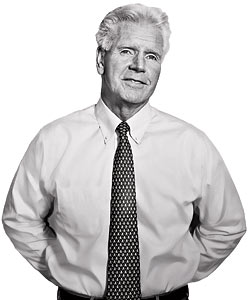Interview conducted and condensed by Jeff Bailey

As a former top executive at two of the country’s biggest executive recruiting firms, and now, for the second time, running your own search boutique, you’re one of the nation’s leading headhunters. Good for you, but why the hell can’t companies nurture and recruit talent themselves?
Unless you’re GE, J.P. Morgan, Intel, or Microsoft, you don’t have the resources to recruit, train, mentor, and retain a lot of talent. The [midsize] companies have a CEO, then one, two, or three other players. Then there’s a huge drop-off. The average life cycle of a public company CEO is four and a half years. After that, they have this propensity to say, “Now what?”
Any Chicago-area companies that do a good job of developing talent? Of course, that means recruiters look to pluck executives from such firms, right?
Abbott does a fine job. Grainger does a particularly fine job. They do become targets because they’re known for developing talent.
Beneath the glamour of the C-suite [CEOs, CFOs, and so on] searches you handle, there are laid-off middle managers, highly skilled but narrowly trained professionals dislocated by corporate upheaval, young and rising managers upended by takeovers or downsizing. Are there lessons these hapless souls could learn by looking at your practice?
Sure. I’m a finder. Companies come to me: “We need this; go find it.” Typically, I’m going after someone who’s doing fine, has his head down. The first lesson is do well the task at hand, and the finders will find you—over time.
How does a person at the CFO or CEO level explain that he or she was fired? Is there something the rest of us can learn from that?
Honesty is the only policy. If you were taken out and there’s a story, you’ve got to articulate that story. Remember, Lee Iacocca was fired. We have to be sensitive to the fact that some people don’t get along. The best way to deal with this is references. If you haven’t established relationships with a lot of people who can speak to your abilities—we talk to 15 typically—that’s a problem.
Can a candidate be too hungry?
A search for a finder like me is a 90- to 120-day exercise. I have a candidate right now who literally e-mails me—“Anything happening?”—every Monday morning. That’s a little over-the-top. Having said that, there are a lot of crummy companies that don’t get back to people.
Yes, companies say e-mail your application but don’t bother us.
Bother ’em. Conversely, LinkedIn is a passive site. Post your resumé and sit. It’s effective.
In your 34 years of doing this, what have you found to be the signs that a candidate will be a pain in the ass?
First and foremost, if they’re not forthcoming. Or their ego is totally inappropriate. I have very sensitive antennae when it comes to jerks. Clients want me to screen them out.
Disaster?
An industrial company wanted a CFO. The CEO only wanted GE people. References on the GE guy were OK, not great. I should have said, “Don’t do it.” Six months later, the CEO called and said, “Guy’s a disaster. He sucks.” My partner, Tom Kolder, bailed me out. He had a great guy in his pocket. Our contract says if [candidates] don’t work out for a year, free replacement.
Photograph: Bob Stefko


